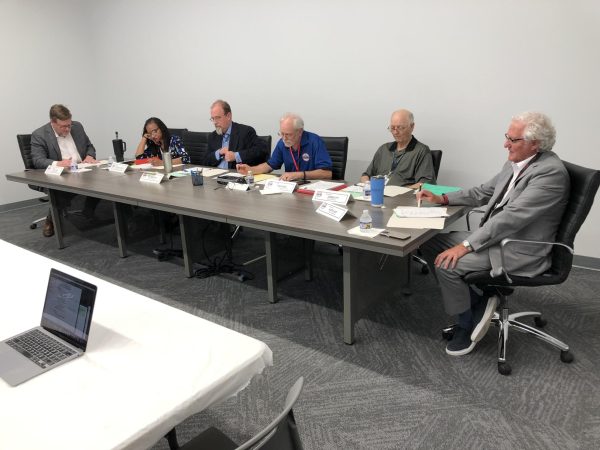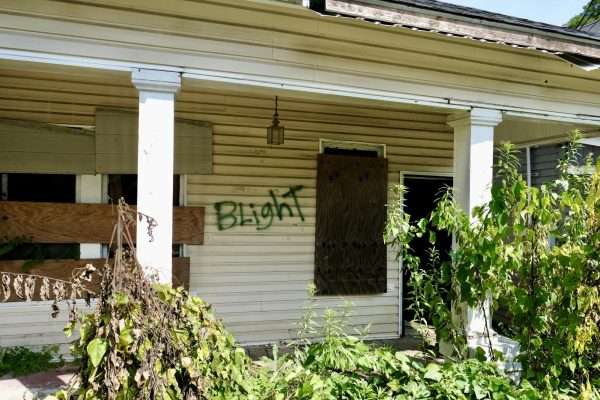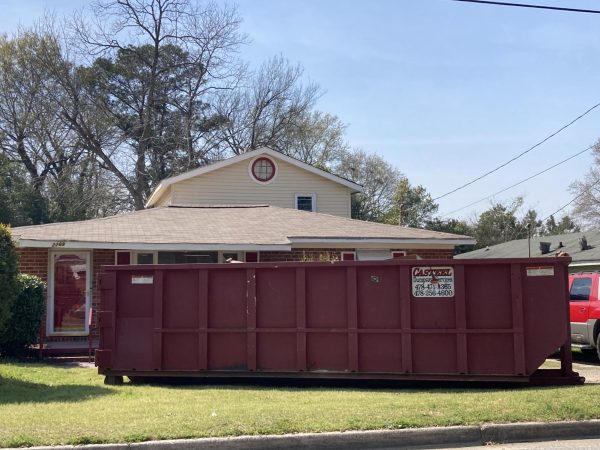Holding Macon Accountable: Government Spending on Homelessness
In Macon, solving homelessness is a community effort.
Whether it be due to a loss of a job, domestic violence, or mental instability, homelessness is an ever-present issue in the United States. In 2021, the Georgia Department of Community Affairs reported that approximately 172 people experienced homelessness in Macon. It’s something the city has devoted time, money, and energy to alleviate. Between nonprofits, community development efforts, and federal funding, millions of dollars and large amounts of resources are poured into the issue every year.
While homeless advocates say there is never enough money when it comes to fixing homelessness or poverty, they say collaboration helps greatly.
“The majority of everything that we do is based upon partnerships,” said Wanzina Jackson, manager of the Economic and Community Development department, which oversees a large portion of the tax dollars allocated for housing insecurity. “I mean, we can’t do any of this by ourselves.”
Macon has several sources of funding to deal with homelessness, including its allocation of public dollars from the county the state, and the U.S. Department of Housing and Urban Development.
Macon receives three types of funding designated for housing efforts from HUD annually: the Community Development Block Grant funds, the Emergency Shelter/Solutions Grant and funds from the HOME Investment Partnerships Program. These are managed through the city’s ECD department.
Macon’s HUD proposal for Fiscal Year 2024 totals just more than $3.3 million with approximately $1.8 million attributed to CDBG, $1.3 million to HOME and $159,452 for ESG.
“There’s been significant investment in both Mayor (Robert) Reichert administrations and Mayor (Lester) Miller’s administration in permanent supportive housing, affordable housing and homelessness,” said Rev. Jake Hall, who is the director of the United to End Homelessness initiative, spearheaded by the United Way of Central Georgia.
However, Hall said that for homeless individuals, navigating these funds can be complicated and confusing.
“Some of these programs have been running for a very long time,” Hall said. “This is a business where you need to work yourself out of business quickly and effectively.”
OVERVIEW
Macon-Bibb receives state funding through the Balance of State Continuum of Care run by the Georgia Department of Community Affairs. This is how the majority of counties in Georgia address homelessness. The county is required to file a consolidated plan every five years to inform HUD of how they plan to spend the funds.
The Consolidated Plan is carried out through Annual Action Plans, which provide a concise summary of the actions, activities, and specific federal and non-federal resources that will be used each year to address the priority needs and specific goals identified by the Consolidated Plan. Grantees report on accomplishments and progress toward Consolidated Plan goals in the Consolidated Annual Performance and Evaluation Report (CAPER).
According to Hall, these funds were designed for emergency sheltering, rapid rehousing and permanent supportive housing up to housing choice vouchers, formerly known as Section 8 affordable housing.
GRANTS
Each of the three HUD-awarded grants targets varying issues regarding homelessness.
According to HUD, CDBG provides annual funding to develop viable urban communities by providing decent housing and a suitable living environment, and by expanding economic opportunities.
In relation to CDBG, Macon is classified as an entitled community, meaning eligibility for grantees includes principal cities of metropolitan statistical areas (MSAs) and other metropolitan cities with populations of at least 50,000. It also develops its own programming and funding priorities for the county.
“(CDGB) is the one that most people hear about the most because that one is the one that is more flexible as far as social service,” Jackson said. “And most of the time that's what most agencies are coming to us for are those types of services as far as tutorial, whether it may be counseling or whether it may be some other type of senior service.”
Many of the grants have a specific time limit to exhaust the funds. According to Charlotte Woody, assistant manager of the ECD, there is a wider time limit to spend the money with CDBG than with other grants. Additionally, CDBG falls within a 15% spending cap that ECD can’t go over due to federal regulation, regardless of the amount received.
Each year, agencies have the opportunity to apply for grant funding. Jackson notes that this is due to the limited amount of money that ECD has each year coming to them. Agencies can apply for CDBG funding in the fall and then many of the grants have a specific time limit to exhaust the funds. According to Woody, there is a wider time limit to spend the money with CDBG than with other grants.
HOME is designed to increase homeownership and affordable housing opportunities for those with low and very low income. This income limit is determined by HUD.
Jackson said this limit is based on the household income as well as the number of people. For affordable housing, HUD provides what type of rental level ECD can have on the units.
Since Macon has over 50,000 residents, it is known as a participating jurisdiction, defined as any state or local government designated by HUD to administer HOME grants and funds are allocated by formula.
There is a new formula allocation for HOME funds requiring a local match, and for Macon-Bibb this match is 12.5 percent of the federal funding.
The adjusted budget includes program income received as well as ongoing multiyear projects that were not completed in the previous year and have unexpended funds that will flow into the new Fiscal Year.
Emergency Solutions Grant (ESG) funding is meant for people at risk of homelessness. It is also used to identify sheltered and unsheltered homeless persons and provide the services necessary to help those persons quickly regain stability in permanent housing according to HUD.
The COVID-19 pandemic had a substantial impact on how ESG grants are distributed. After the onset of the pandemic in 2020, Congress passed the Coronavirus Aid, Relief, and Economic Security (CARES) Act, which designated a new category of funding called ESG-CV. This is more flexible than typical ESG funding and is meant to help alleviate the negative effects that the pandemic had on homelessness, including food services normally not included in ESG funding.
Macon was awarded two ESG-CV grants from HUD in 2020 totaling approximately $1.5 million. Within the bounds of the ESG-CV grant, there is a 2-year time limit to utilize the funds. They are soon to be exhausted and won’t be included in the upcoming consolidated plan.
With many goals to accommodate homeless individuals in programming and funding, Jackson emphasizes that not everyone who appears to be homeless is actually homeless.
"Just because you see the same person every day on the corner doesn't mean that they're homeless,” Jackson said. “If they have on a different outfit with different shoes and everything else, 9 times out of 10, they’re just coming to hang out. I've seen people actually pull up in cars and get out, I mean, because they're their friends, you know?”

Macon ECD has 14 partner organizations to address pieces of housing insecurity. There are things that these partners have to fulfill in order to receive funding from ECD, including disclosure of services.
One point of contention for transparency for ECD is making sure that the agencies disclose who receives the services.
TRANSPARENCY
With the allocation of these funds in various directions, there have been concerns raised for accountability in how the funds are spent.
In March, a law requiring a state audit of non-profit funds for homeless services was passed, and signed into law May 3.
Jake Hall, executive director of United to End Homelessness Initiative of United Way of Central Georgia, said he’d like to see increased transparency.
“I think knowing where the money goes is a great idea and knowing whether or not a program is effective is a great idea,” Hall said. “I think if we're studying it to reduce it, that's a bad idea, unless you have a plan for housing in Georgia is a space that really needs support in everything.”
The ECD implements a monitoring system to keep its 14 partners in constant check.
Each month, the agencies have to report to ECD consisting of how many clients they served, what they did and the amount of money spent. At the end of the fiscal year, the agencies must compile a log of what they have done and if they have achieved their goals.
“To me, this is just another step of what the partners are already used to doing,” Woody said. “I’m looking at what their books look like, if you served like what you said in your contract, if they are putting the money in the bank that we sent over and if they have good financial procedures.”
Although Woody has faith in ESG partners and believes they do a good job of documentation, there are some that all of them are not willing to do.
“We have to provide that information back to HUD,” Woody said. “I can't just tell 'em I'm using the money. I must have something to show how I'm using the money.”
WHAT’S NEXT
The county’s Consolidated Plan for addressing housing insecurity is to be updated next year. Those who are at risk for homelessness, those having an unstable income and people who choose to stay homeless will all receive services.
“Hopefully there will be an increase in funding because it's limited funding that we receive,” Woody said. “That's why it's a good thing we are with the Balance of State because the agencies can go over and get some more funding on the other side.”
As the designated COVID-19 relief grant suspends, the loss of food services goes with it. In many instances, food is the main thing that people seeking assistance will apply for from ECD. However, some of the agencies have their own feeding plans for homelessness.
Jackson also notes that ECD will continue rental, utility and affordable housing opportunities.
In the future, Woody hopes that one day HUD will provide more funding for agencies in their transportation, job placement and home management services like rent and utilities.
Although Hall believes that there is no amount of money to fix poverty, he, and Macon-Bibb, desire that the process be more simplified.
“At the end of the day, homelessness is a housing problem,” Hall said. “It is the sickest game of musical chairs that's ever been played.”
Correction: This story was edited to reflect that legislation requiring an audit of homeless service providers was signed into law on May 3.
















